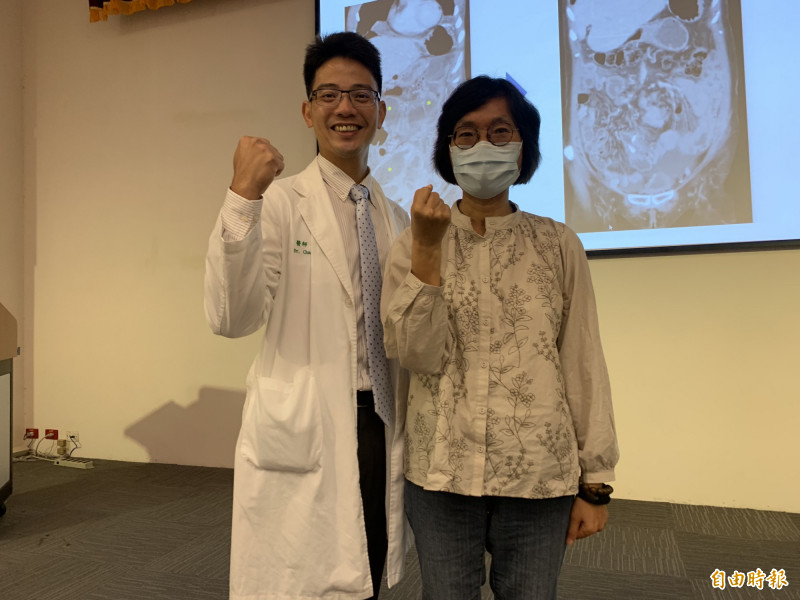Zhang Shenji pointed out that Ms. Lin suffers from stage 4 colorectal cancer, optimistic and active treatment, breaking through the 5-year survival period.
(Photo by reporter Cai Shuyuan)
[Reporter Cai Shuyuan/Taichung Report] 54-year-old Ms. Lin went to the doctor for abdominal pain and bloody stools more than 5 years ago. She was found to have stage 4 colorectal cancer and metastasized to the liver. Last year, the 2nd degree recurrence and metastasis to the peritoneum caused intestinal obstruction. The small intestine swelled like a large intestine. I was unable to defecate or eat, which caused ammonia coma for a time. In April this year, I received intraperitoneal high-pressure aerosol chemotherapy and immune cell therapy. The cancer cells could not be seen, and the cancer index decreased. I was able to eat, defecate and live well. I was optimistic and actively treated, and successfully broke through 5 years of survival.
Zhang Shenji, director of the peritoneal tumor treatment center and director of colorectal surgery at the Hospital Affiliated to China Medical University, said that colorectal cancer ranks first among the top ten cancers in China, with about 15,000 new cases every year, and 30% of them are found to be in the late stage. Ms. Lin’s colorectal cancer For stage 4 cancer, the 5-year survival rate is only 5% to 10%, and the average survival rate is 25 to 35 months. Ms. Lin is optimistic and actively cooperates with the treatment, and the survival period exceeds 5 years.
Please read on...
Zhang Shenji pointed out that colorectal cancer is more likely to occur in people over 50 years old, with an average age of about 67 years old. Nowadays, the younger population is not only related to westernized diet, high-fat and high-sugar diet, many patients have no family history, and half of the patients It is asymptomatic in the early stage, and it is not uncommon to get cancer in the 20s and 30s. It is believed that it may be related to genes. It is recommended that at least one colonoscopy should be done if it is above 45 years old. The survival rate of early detection is more than 90%, and early treatment can be performed.
Zhang Shenji said that colorectal cancer is most likely to go to the liver, lungs and peritoneum. Ms. Lin has encountered them. When she was diagnosed, the tumor in the sigmoid colon had metastasized to the liver. The liver tumor was 10 cm in size. The lesion was resected, but it recurred and metastasized to the lungs 2 years later. After further treatment and surgery, I felt abdominal distension and discomfort in October last year. The examination found that there was a recurrence, and the cancer cells had metastasized to multiple places in the peritoneum. The conventional intravenous chemotherapy did not work well.
After laparoscopic surgery, a high-pressure atomizer is used to spray nano-sized chemotherapy drugs into the peritoneum to kill tumor cells more uniformly and deeply.
(Photographed by reporter Cai Shuyuan)
Ms. Lin's cancer cells diffusely metastasized to the peritoneum, causing intestinal obstruction, unable to defecate or eat. The small intestine with a diameter of 1 or 2 cm swelled into a large intestine with a diameter of 5 cm. She was also sent to the emergency department in an ammonia coma due to the long-term inability to excrete feces. After receiving intraperitoneal high-pressure aerosol chemotherapy, through laparoscopic surgery, use a high-pressure nebulizer to spray nano-sized chemotherapy drugs into the peritoneum, so that the drugs can enter the peritoneal tissue more uniformly and deeply to kill cancer cells, relieve intestinal obstruction, and peritoneal cancer cells I can't see, I can finally eat and taste happiness.
Ms. Lin said that she knew that she was seriously ill, but the doctor encouraged her not to be pessimistic. In order to watch her children grow up and accompany her elderly parents, she bravely fought against cancer. She thanked the medical team and family for their support, and also called on patients to be optimistic and cooperate with the treatment It is the only way to fight cancer.
Ms. Lin's cancer cells metastasized to the peritoneum and caused intestinal obstruction. The small intestine swelled like the large intestine (marked on the left). After intraperitoneal hyperbaric aerosol chemotherapy and immune cell therapy, the swelling of the small intestine subsided and no cancer cells were seen in the peritoneum (right).
(Photo by reporter Cai Shuyuan)
Zhang Shenji pointed out that Ms. Lin's cancer cells metastasized to the peritoneum and caused intestinal obstruction. The small intestine was swollen like the large intestine (marked place), and she was unable to eat and defecate.
(Photo by reporter Cai Shuyuan)
☆Health news will never be missed, click like to follow the fan page.
☆For more important medical news, please go to Liberty Health.com.
keywords
colorectal cancer
lung
liver
stomach ache
Bloody stools
peritoneum
related news
